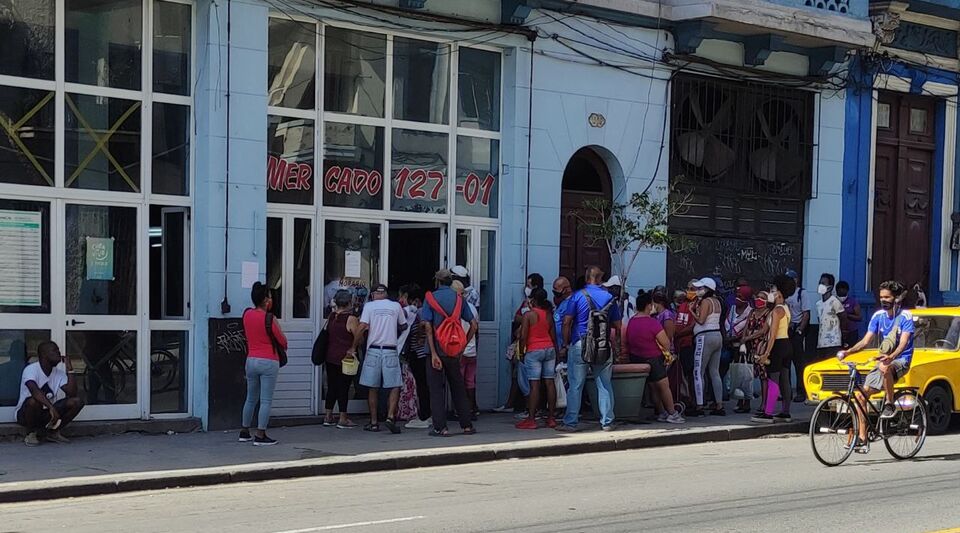Havana Cuba. – When I hear the word “hater” in the mouths of spokesmen for the dictatorship or even pronounced by the main figures of the communist regime, I do nothing but burst out laughing, not only because I know that sooner rather than later we will hear them, 90 miles away from Cuba, to swear that they were forced to say such nonsense, but because I imagine them all as that abusive, tyrannical, lying and manipulative husband who wants his wife’s love but hardly receives hate and contempt.
He beats her, humiliates her, silences her, locks her up, threatens her with hunger and death and still expects full affection, respect, devotion, loyalty and docility in return, not only because the few understandings of his bestial nature do not allow him to understand that no love is imposed by force but because he himself, trained since childhood in simulations as a survival strategy, never expects “true” love and loyalty but only the pretense of a servant, the performance where the force of so much accumulated hatred resembles a great passion.
“Sick passion, insane, twisted but passion.” This is how the hypocritical despot who submits thinks and who at the same time wants to keep up the appearance of a “happy marriage” with that train of “loyal” officials and spokesmen who know how to cover up feelings even darker than hatred.
We have seen it during these days of the migratory wave in which some of those most furious officials and spokesmen —of those who most liked to brand independent journalists, activists and opponents as “haters”—, have headed north trying to make a clean slate in their files as accomplices of a dictatorship, which is like throwing ethics, the commitment to the truth, into the fire, which should always guide public and journalistic exercises.
The word “hater” in the mouth of those who really promote hatred, no matter how much they try to install it in their favor in a tricky way in public opinion, could never be pejorative as long as they try to transfer to the victims a guilt that does not belong to them.
It is a perverse but at the same time laughable —because it is stupid— the communication strategy of the Communist Party and there are orders circulating to the “cybercombatants”, “cyberclairs”, trolls and spokespersons to use it both in the media and on social networks to disqualify anyone who dares to criticize, denounce or summon the dictatorship.
Evidently there is a script, a methodology designed by the regime to, through language, repetition, try to sneak into the heads of Cuban men and women the idea that criticizing, calling the government to account, demanding, opposing, revealing hidden truths , summoning public officials, expressing oneself in the street and on social networks without fear of reprisals from the political police, not giving in to blackmail, is hate.
And not only that —because ultimately hating and acting against the power that oppresses will always be morally legitimate—, but it also tries to make us believe that we hate because of an insane vocation, without foundations, and not because we are fed up with an ideological kidnapping that has spread throughout time more than humanly bearable, and because the roots and objects of our anger are more than evident.
But this manipulative strategy does not work with those who line up at dawn for chicken, oil, rice, gasoline, toilet paper, pension, passport and even to die and be buried, nor with the “faithful” and “grateful” that they saw their life savings evaporate with the “Sort Task” —they themselves have given all the reasons to hate and even to think about killing or committing suicide—but it is part of an “export” staging, aimed at pretending to be victims and thus plundering the pockets of all those foreigners, businessmen, agents of influence and fanatics of Castroism who make our agony more prolonged with their dodgy, idealism, selfishness, mediocrity, opportunism and naivety.
A few days ago I heard a teenager on the street, dressed in a school uniform, who somewhat jokingly but out of political annoyance, described himself as a “hater.” He explained to me, along with other young people who accompanied him, why they felt so comfortable calling themselves as such, and even with other terms with which the regime’s discourse intends to disqualify those who oppose or challenge it.
It is interesting how they rejoiced in appropriating such terms precisely because they are negatively marked by a regime that does not represent them. They called themselves, as an urban group, “The haters”, while they enjoyed shouting other phrases such as “Homeland and Life”, “We are going to Nicaragua” or “DPEPDPE”, although the latter in “extended mode” and loudly, not whispered or abbreviated. Bravo for them! I rejoice to see that all is not lost.
No one who lives in Cuba with their feet firmly planted on the ground, and who also knows from their own experience what the true source of so much misery is —material and human—, swallows that story of “haters” against “innocent dictators”, not when The latter have not only criminalized for decades free expression, entrepreneurship, the exercise of journalism independent of power and of any political faction, as well as the right to seek information and demand transparency from government institutions, but also respond with repression. , prison, exile and physical and psychological torture to any form of political dissent, including artistic manifestations that are uncomfortable for them.
Today we are left over from proof of the latter, beyond the current cases of Luis Manuel Otero Alcántara or Maykel Osorbo. I speak, without mentioning names in order not to forget any, of ancient examples that together would be enough to hate a regime just for the damage inflicted on Cuban culture in more than 60 years.
More than half a century not only of repression but of annihilation of the most minuscule focus of political or ideological dissidence, of marginalization and silencing of differences. And if that crime alone is not enough to hate and feel that our feeling, however dark, is legitimate, then how much more must we endure to stop turning the other cheek to the abuser?
OPINION ARTICLE
The opinions expressed in this article are the sole responsibility of the issuer and do not necessarily represent the opinion of CubaNet.
Receive information from CubaNet on your cell phone through WhatsApp. Send us a message with the word “CUBA” on the phone +1 (786) 316-2072, You can also subscribe to our electronic newsletter by giving click here.






